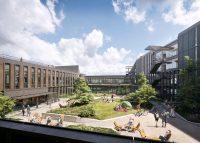Facebook has snagged another prime piece of real estate — and given the shaky office sector a boost.
The tech giant announced that it will buy the brand new Bellevue, Washington, headquarters built by Recreational Equipment Inc., or REI, which the consumer outdoor equipment company never used.
Facebook announced it will pay $368 million for the 8-acre campus, according to the Seattle Times. It already leases 850,000 square feet of office space in the nearby Spring District neighborhood.
Read more



Mark Zuckerberg’s online empire has made significant investments in office space over the past year. In addition to expanding its footprint in the Seattle suburbs, Facebook has also inked deals for 1.5 million square feet at New York City’s Hudson Yards and 730,000 square feet at the nearby Farley Post Office complex.
It’s unclear how the pandemic will affect Facebook’s real estate plans.The company has said it plans to have many of its employees work remotely over the next five years.
REI’s campus, designed by architecture firm NBBJ, was created with the retailer’s outdoorsy ethos in mind: It has rooftop terraces, fire pits and a series of outdoor staircases and bridges. Construction on the complex began in 2018 and wrapped up last month.
But the coronavirus derailed REI’s big move. In May, the company reported a 30 percent decline in revenue for the year, according to the Seattle Times. Ben Steele, REI’s chief customer officer, said that the success of the company’s work-from-home program prompted the company to re-examine its real estate footprint. In August, REI announced it would sell the Bellevue campus, which it never occupied.
REI spokesperson Halley Knigge said last month that company leadership anticipates the sale “would bring a positive return on our four-year investment.”
Facebook employs around 5,000 people across 3 million square feet in the greater Seattle area, making it and Google the two largest out-of-town employers in the area. Its footprint in the Seattle area is its second-largest behind its headquarters in Silicon Valley’s Menlo Park. [Seattle Times] — Dennis Lynch
